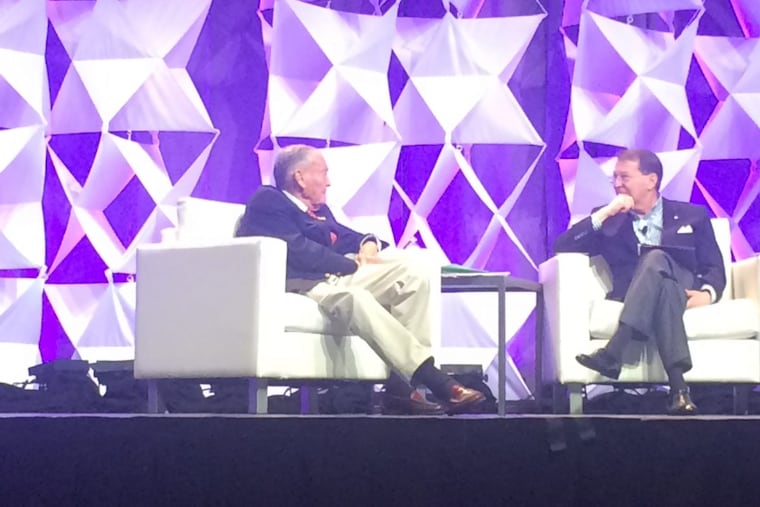A veteran Philly investor, down to his clients’ last $10 billion, is closing his firm
“Our record for the past five years sucks,” Theodore Aronson added in an interview. His departure signals how investing has changed.

Theodore “Ted” Aronson, one of the last of the bargain-hunting Philadelphia “value-stock” investors, is calling it quits.
“We will be shuttering [our firm] AJO on Dec. 31,” Aronson, 68, wrote in a note Tuesday to clients who still hold $10 billion at his company on South Broad Street, though that’s down from a peak of $30 billion in the early 2000s.
“Our record for the past five years sucks,” Aronson added in an interview.
“A 44-person operation, even with $10 billion, sounds like a lot of money. But it wasn’t working out. So we decided, ‘Let’s set the clients free.’”
Aronson said clients have sent mostly positive messages. “Money managers never do this,” he said. “They stretch it out. They sell it. I’m looking for that graceful end.”
What changed? Aronson, a “quantitative” stock picker, had been a pioneer at using modern computing to update an old strategy, popular at such Philadelphia trust companies as Provident. That approach conserved fortunes for heirs of the city’s factory and railroad fortunes by identifying low-priced but solid companies likely to boost investor payouts and gain share value.
He says he earned clients about $2 billion in above-market-index profits — what investors call “alpha” — from its founding in 1984 through 2015.
When he started in the business, Aronson said it was easy for a market-literate, computer-familiar professional to beat the crowds. In that era, he said, a savvy investor could spot a trend early, and watch the trades gain value as the market slowly caught up— trends that today are instantly exploited by high-speed, automated programs.
Aronson began his investment career at the former Philadelphia-based brokerage of Drexel Burnham, where his colleagues included future junk-bond king Michael Milken, and his interns included one Brian L. Roberts, the Comcast heir and future chief executive.
As a quantitative investor, or “quant,” focused on company, market and industry data, he avoiding the schmoozing with top executives that was elsewhere a ritual of big-league stock-picking.
“If CEOs’ lips move, it means they are lying,” Aronson liked to repeat. “Really, that’s a snotty things to say. Some of my best personal friends run elite corporations. They are honorable people. But honorable or not, sometimes the numbers work for an investment, and sometimes they do not.”
His firm’s rapid growth brought in such clients as colleges and the Florida, Oregon and City of Philadelphia pension systems, though the city terminated AJO for poor performance last year.
Aronson, a Wharton grad, was a leader in the Chartered Financial Analysts (CFA) organization and other industry groups. “Ted was an academic advisor for a generation of investment professionals who came out of Wharton,” succeeding the late John Neff, the market-beating stock-picker for the Vanguard Windsor fund, in that role, said Matthew Taylor, senior member at Permit Capital Advisors LLC, Conshohocken and a past fund manager.
The good years, especially, generated management fees that enabled him to hire dozens of analysts and business staff. In turn, Aronson’s share of the profits enabled him and his wife, Barbara, to back charitable causes such as WXPN radio and the Nature Conservancy, and to buy what was in 2010 the most expensive apartment in Philadelphia, the $12.5 million penthouse at 1706 Rittenhouse.
But by then, trends that were to make brave, brilliant stock-picking teams scarce were fast advancing. Automated trading programs and high-volume short-term trades as practiced by firms such as Bala Cynwyd-based Susquehanna International Group made it tougher to find bargains.
Managers also faced competition from low-fee, index-based mutual funds and exchange-traded funds offered by Malvern-based Vanguard Group, founded by Aronson’s longtime buddy John C. Bogle, Aronson’s frequent intellectual sparring partner at industry gatherings.
“If I were to start a firm today, I’d probably halve the expectations,” Aronson said. “That compression in value-added makes for a compression in fees. My late, great friend Jack Bogle had a hand in that. Bogle democratized the markets — he made it easy for investors to get market returns, and difficult to add value."
The stock market’s recent concentration on a handful of large, fast-growing tech companies, Amazon, Apple, Facebook, Google parent Alphabet, and Microsoft, has been hard on “value stocks,” which have fallen far behind. Aronson estimates that AJO accounts have trailed the markets by as much as $1.8 billion since 2015. Stopping now lets him retire with a net positive long-term record, though sharply below his peak.
“We built it by outperforming our benchmarks. We lost it the same way," he concluded. "The last five years have been so painful. ‘Value’ stocks will come back. But we are throwing in the towel.”
Aronson said his managers, including co-CEO Gina Moore and chief investment officer Greg McIntire, are talking about putting a new firm together.
But “AJO’s closing will mark the end of my career,” he concluded in his note to clients. “While I am hanging up my spurs, my partners and colleagues are not. I plan to support them as they prepare to ride again.”